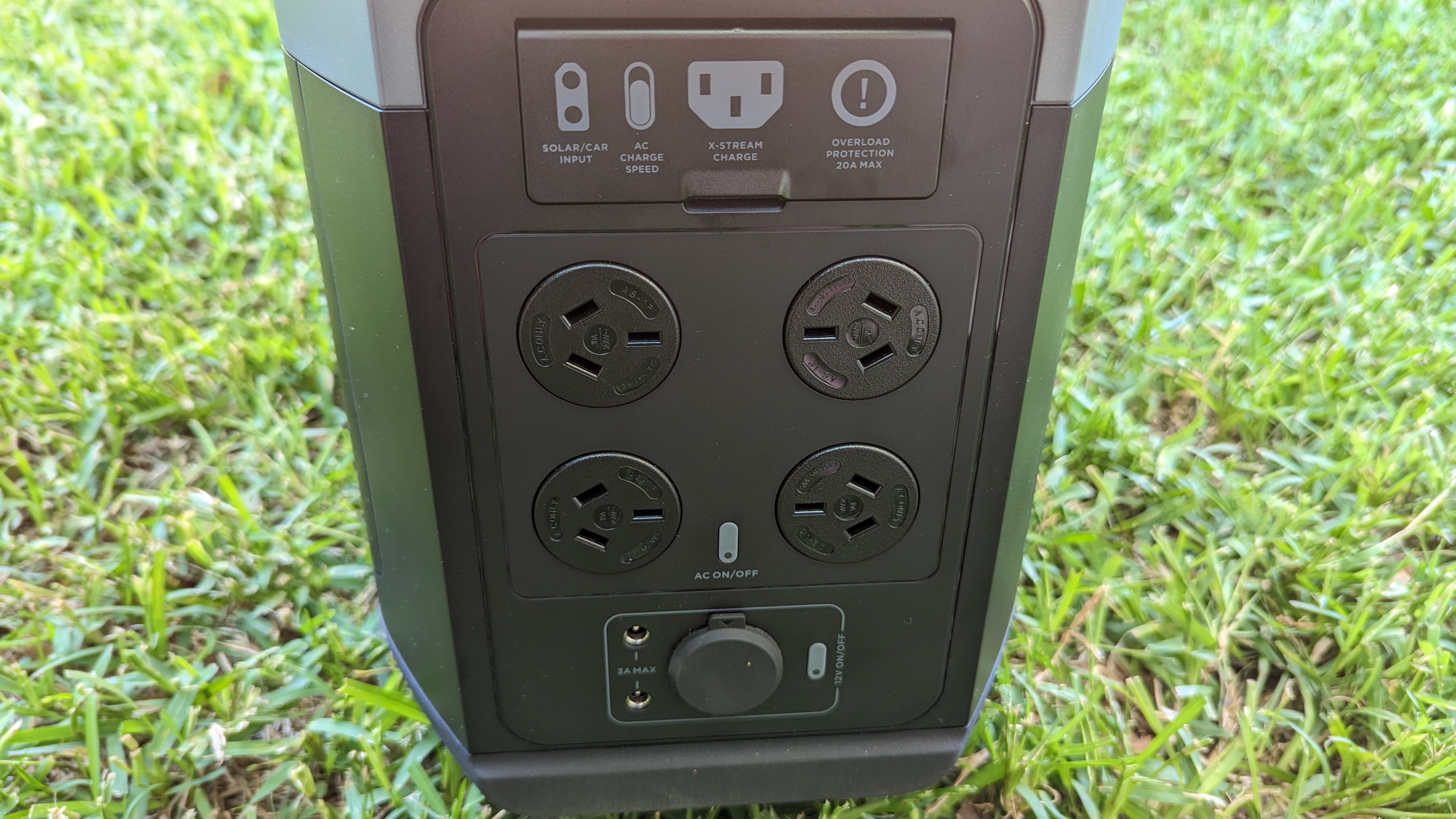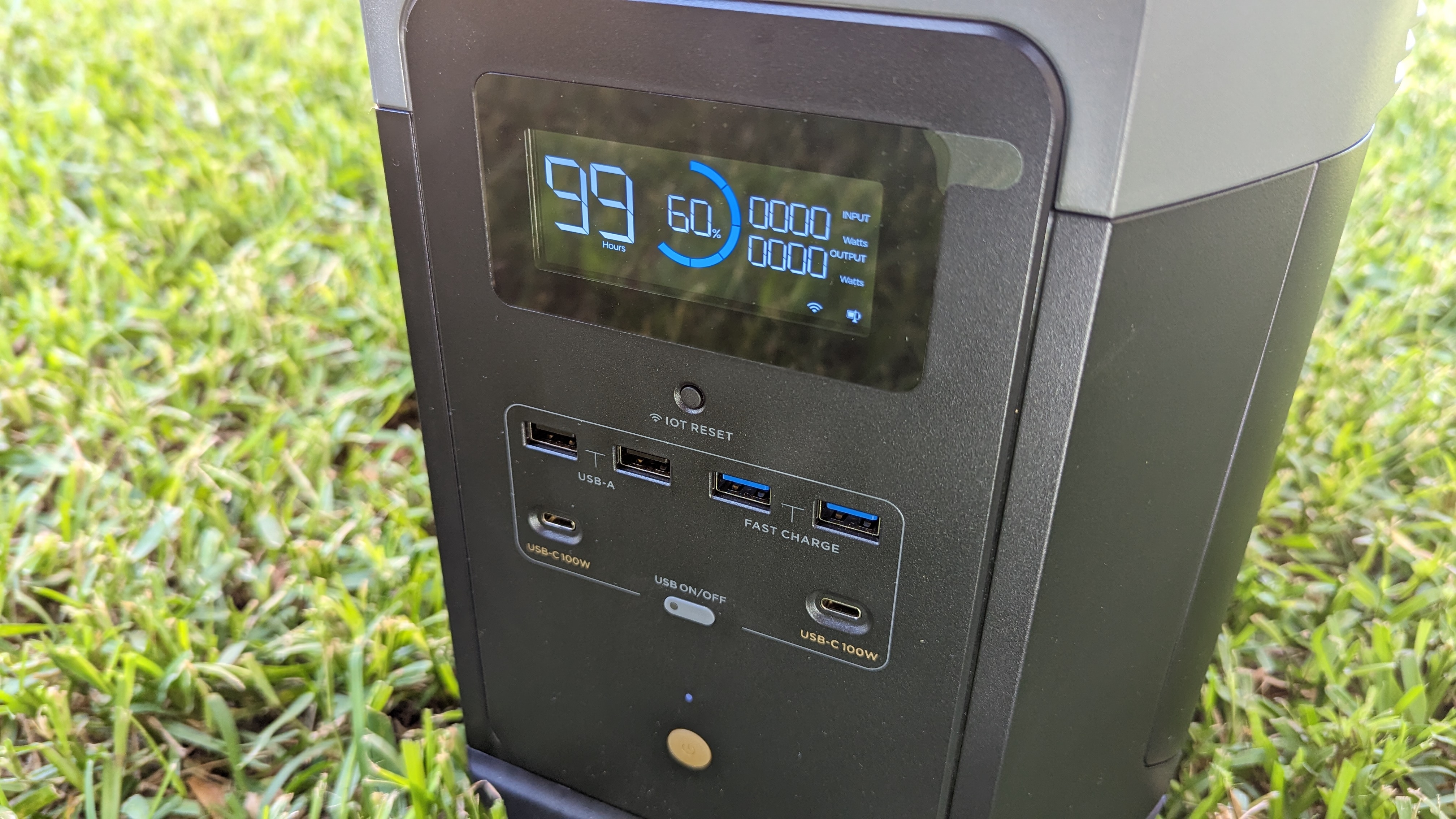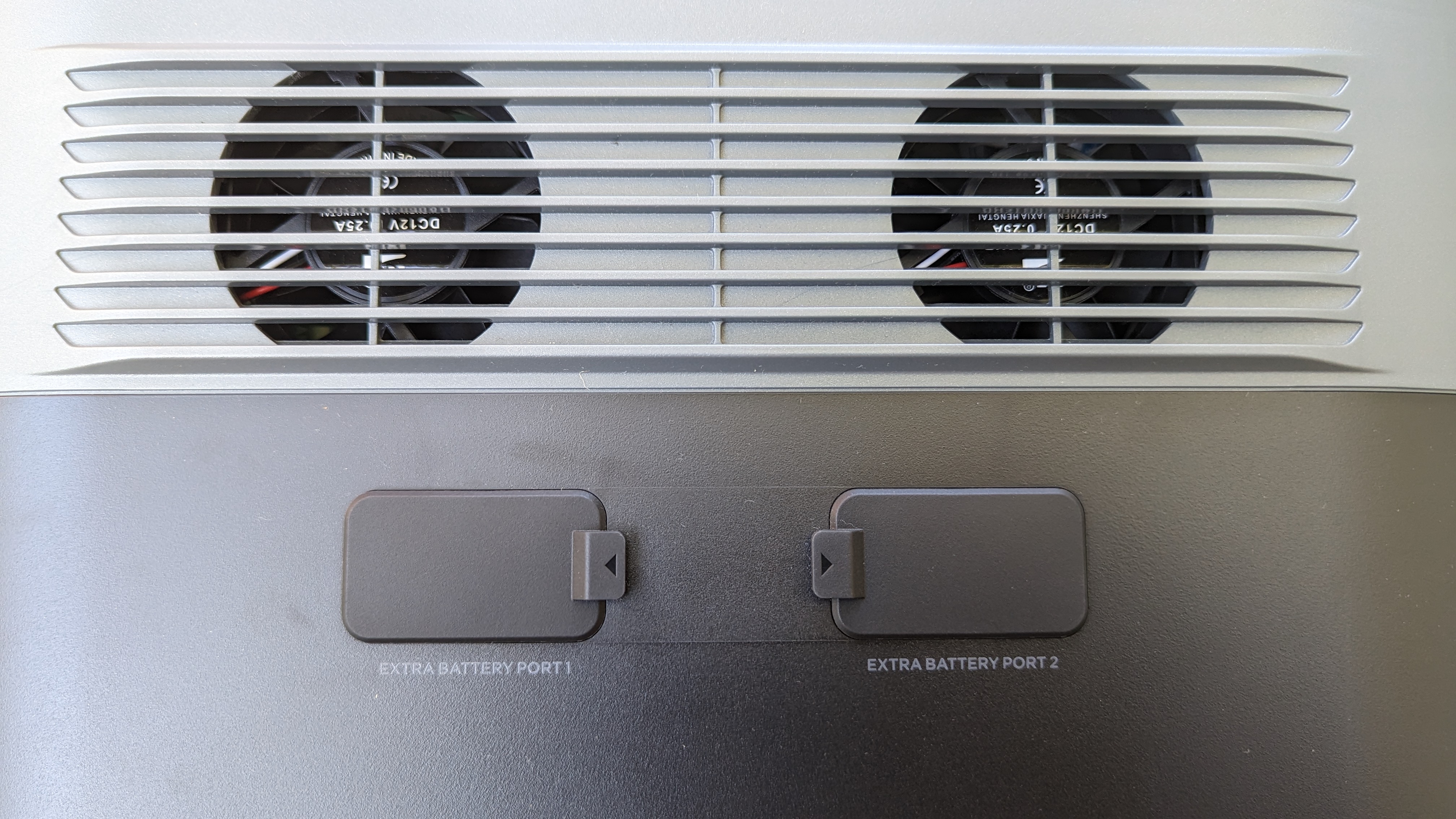EcoFlow Delta Max 2000: two-minute review
The Delta Max is a portable power station – basically a huge battery and inverter that've been stuffed into a box along with a solar controller and an AC/DC charger. It can be used for everything from powering your fridge and other home appliances during a blackout, taken on the road, for camping, at a work site, or it can become the basis of a mini off-grid system.
The Max has a battery capacity of 2,016Wh (aka 2kWh), which is enough to keep the average phone running for about a year. The Max can also have two external batteries connected for a total capacity of 6kWh, or be linked up to a smart generator for total off-grid power. There’s also a cheaper Max 1,600Wh version with a smaller battery.
The Max includes four 230V sockets, which share 2,400W (4,600W surge) of pure sine wave output, and can be used like an uninterruptible power supply (UPS). You also get two 100W USB-C Power Delivery (PD) spec ports that can charge things like phones or laptops, as well as four normal USB-A ports, and various 12V outputs. In other words, you can plug just about anything into the Max and charge it.
Recharging the power station from a wall socket can be done at up to a very impressive 2,000W, and in testing we found that from dead flat it will hit 80% full in a bit over an hour. Alternatively you can charge at up to 800W from solar or from a 12 or 24 volt car accessory port at up to 8A. So in a nutshell, it allows you to store power from a range of sources, and use it when needed most.
While the Max itself has a small screen, the main control for the Delta Max is via a slick phone app that lets you see everything at a glance, or delve into deeper settings. There’s a range of customization possible, including important options such as setting the maximum charge and discharge levels to increase cycle life. You can also adjust charge rates, set minimum and maximum charge values, turn outputs on and off, and configure extras such as automatic generator charging. It connects via Bluetooth or Wi-Fi, and with the later you can also remotely access the Max via the internet.
The Delta Max isn’t perfect of course. We found it a little noisy under load, the accessories are pricey. We also wish the app had more options for data logging and automation. Still, for those who need its specific features and capacity, the compact all-in-one nature and incredibly fast charging make it a solid buy. And if the Delta Max doesn’t suit, EcoFlow has a large range of smaller and larger portable (and not so portable) power stations.

EcoFlow Delta Max 2000 review: price and availability
- How much does it cost? $2,099 / £1,999 / AU$3,599
- When is it available? Available now
- Where can you get it? Available in most major markets including the US, UK and Australia
Availability for the EcoFlow Delta Max 2000 is generally excellent, but pricing does vary a lot across retailers, so make sure you shop around and keep an eye out for promotions.
Value wise, the Delta Max 2000 is a mostly very positive mixed bag. There are cheaper options (and DIY can be much more affordable) but for a ready-to-go, all-in-one power solution with incredibly fast charging, the Delta Max is hard to beat. It’s still a premium price, but the matching features mean it is well worth it for those who need the specific functionality it provides.
• Value score: 4 / 5
EcoFlow Delta Max 2000 review: design and features
- X-Boost for high wattage appliances
- Very fast charging
- Solar over-provisioning
- 24 + 12 month warranty
Our primary frustration with the Delta Max is noise. Packing so much gear in a compact body means the heat builds up quickly, and four fans are needed to keep the Max cool under load. With the fans running it sounds like a particularly noisy laptop, and certainly can ruin the mood of a clear quiet night camping. With fans needed for cooling, dust build up is a reasonable concern and the Delta Max doesn’t have filter grills, and there is no easily accessible user option for cleaning things out.
Capacity: 2016Wh
AC Output: 2400W (Surge 4600W) Pure Sine Wave 230V
Solar Charging: 800W charge rate, 1300W max input
Cycle Life: 800 cycles to 80% capacity
USB Charging: 2x 100W USB-C, 4x USB-A
Other Outputs: 12V, 3A
Dimensions: 50 x 24 x 31 cm
Weight: 22kg
Warranty: 24 + 12 month
A key advantage of the Delta Max is the very impressive 2,000W charge rate, which is many multiple times faster than most of its competition. Delta Max uses NCM (nickel, cobalt and manganese) lithium-ion batteries, and can recharge from near empty to 80% in about an hour when plugged into a wall socket. This makes it ideal for usage scenarios where fast charging is important, but the downside is a lower overall cycle life. The Max is rated for 800 recharge cycles down to 80% capacity, which is as expected for the chemistry, but means if you want to do daily cycles of the full capacity, a power station using LiFePO4 cells (such as the Delta Pro) is better suited.
The 2,400W AC output includes an additional feature called X-Boost. This allows you to run higher-wattage products at low power – basically, the power station will limit power to 2,400W rather than overload and cut out. You can turn the AC inverter on and off via the remote or with a button on the Max, and adjust options such as inverter timeout when not in use, to save power.
For solar charging, the Delta Max accepts a 11-100V input, with a short circuit current of 13A – giving 1,300 total. The actual MPPT solar charger inside has a maximum charge output of 800W. This means you can overprovision solar by a large amount, which (it's claimed) enables collecting up to 62% more power during cloudy weather.
The EcoFlow Max is backed up by an excellent 2 year warranty, with an extra year if you register online.
• Design and features score: 4.5 / 5

EcoFlow Delta Max 2000 review: performance
- Excellent surge capacity
- Proficient UPS functionality
- Plentiful USB outputs
At 22kg, the Max is pretty heavy, but thanks to the large handles, most able-bodied individuals should be able to move it around easily. It’s built tough, and we have no concerns about it standing up to ongoing use.
In testing, the AC sockets provided 2,400W of smooth sine wave power, and happily handled repeated surges. The X-Boost function made it easy to run multiple high wattage devices that would normally trigger an overload. On the load tester, the USB ports all managed their rated spec – including both USB-C ports providing 100W at the same time.
During testing, we could charge the Max from 20% to 80% in around 53 minutes. Solar charging worked well, and while the app options were a little limited for detailed monitoring, we didn’t notice any issues with efficiency. Car charging is handy but slow (due to the car's limited output), and only adds about 5% battery per hour of driving.
One important feature is using the Max as a UPS. It offers a 30ms max switch time, which is fine for most devices, and didn’t cause an issue for a desktop computer or network-attached storage appliance we tested in normal use, but some lower power devices (such as a TV) tended to power off and then back on during the switch.
It’s not possible for us to get any meaningful test of cycle life in the short period over which a review like this one takes place, but we can report that we didn't notice any anomalies. We found the unit tended to self discharge a bit faster than the rated 1-year standby time, so it’s best to make sure it is plugged in every few months.
• Performance score: 4 / 5

EcoFlow Delta Max 2000 review: upgrades and accessories
- Bi-facial solar
- Battery add-ons
- Smart generator connection
For the Delta Max, the available accessories include a variety of solar panels, extra batteries, an air-conditioner, a smart generator, and a gaggle of extension and charging cables, and a padded bag. Beyond that there are associated products, such as a smart generator, a portable air conditioner and even power kits designed for off grid setups. Some of the accessories are decently priced, but others such as the solar panels can be on the expensive side – albeit with high build and design quality. The Delta Max uses standard solar panel connectors, so you can use whatever combination of solar panels you want, provided they meet the maximum input voltage and short-circuit current ratings.
EcoFlow supplied us with an interesting 220W bi-facial fold-out solar panel for testing. It comes with its own carry bag that acts as a case. It has panels on the front as normal, but also extras on the rear to collect ambient light to boost overall collection. It worked well, and by using a white or reflective surface behind it, it’s easily possible to boost power production by 20% or more. The downside is the bifacial panel is almost as heavy as a 400W solar setup. At $549 / £549 / AU$799 it’s also not the cheapest, and while fake output panels are rife in online marketplaces, it’s possible to buy good quality, name brand fold-out panels with a similar rating for much less.

Should I buy the EcoFlow Delta Max 2000?
Buy it if...
Don't buy it if...
Final verdict
As a solar DIY enthusiast, I had a healthy skepticism that the flashy, all-in-one Delta Max could live up to its premium price tag. But after extensive testing, it won me over with its well-balanced featureset and simple all-in-one package. It’s big but portable, and has a power output which is suitable for running most normal appliances. That’s not to say you should take a TV and microwave camping... but if you did, the Delta Max could run them.
It’s a bit noisy when at heavier use, and we worry about dust buildup inside or accidentally getting it wet. We also look forward to app upgrades, but these minor issues don’t mean much in the face of all the Max does well.
[First reviewed February 2023]
from TechRadar - All the latest technology news https://ift.tt/vcw3UgS

No comments:
Post a Comment